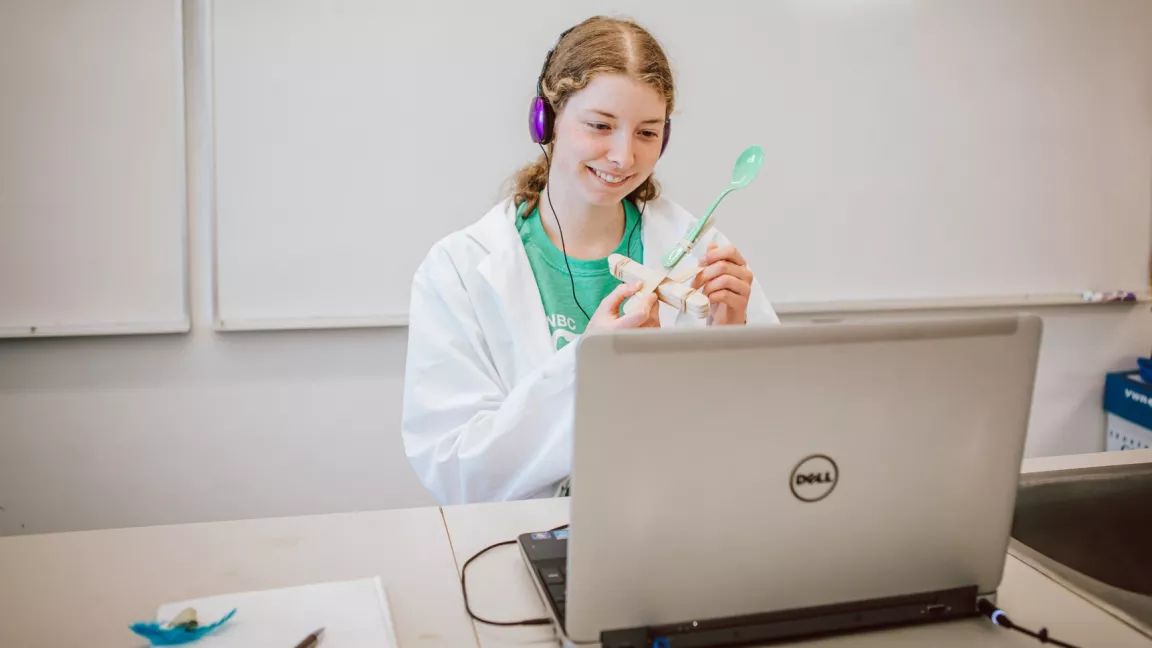Active Minds creates online and at home camp experiences
How do you create a meaningful summer camp experience in the middle of a global pandemic? With public health considerations ruling out the possibility of in-person camps this summer, the UNBC Active Minds team got creative and created three different activity streams to keep children engaged, entertained and educated.

For years the University of Northern British Columbia Active Minds program, presented by the BC Oil and Gas Commission, has engaged and inspired children aged six to 12 through its summer camps. The COVID-19 pandemic has changed the nature of the experience, but through creativity and technology organizers are providing children and their parents a fun camp experience from their own homes.
Through a variety of new and innovative programs, children will be able to build a dancing robot, learn how animals stayed warm during the ice age, conduct a hurricane in a jar experiment and interact with UNBC faculty members – all without leaving their home.
“Our goal at Active Minds is to foster enthusiasm in science, technology, engineering and math,” UNBC Development Officer Nicole Gibson says. “The COVID-19 pandemic obligated us to take a different approach this year. Through our activity clubs, activity boxes and Ask a Prof events, we developed a unique program that will expose children to new ways of thinking about science and captivate their imagination.”
Activity Clubs allow children to engage online with camp leaders and other campers as they explore themes ranging from Engineering 101 and Chemistry 101 to Galaxy Explorers and Mini Med. Led by UNBC students, these daily half-hour or one-hour online sessions engage students through hands-on activities and fun games. The clubs support eight summer student jobs.
“I love interacting with our campers online and sharing their excitement about science,” says Alaina Sommerville, a UNBC student and the Active Minds Prince George Co-ordinator. “Helping to build these online programs has been a great experience and it has been fulfilling to see our ideas come to fruition.”
Activity Boxes are designed for children to complete at their own pace. There are five different themes, which correspond with the Activity Clubs, and every box comes with all the supplies you need to complete three different experiments. The boxes contain detailed instructions and science lessons for each experiment.
“We chose activities that contain specialty materials that children may not already have at home,” Sommerville says.
Also new this year is Ask a Prof Fridays on Facebook Live. In these interactive sessions, UNBC faculty members will lead an activity related to their research and answer questions. Geography Assistant Professor Dr. Joseph Shea shares his expertise during the first Ask a Prof Friday on July 17 at 1 p.m. PT. Faculty members from programs ranging from Chemistry to Engineering to Health Sciences to Forestry will lead other sessions on the Active Minds Facebook page on Fridays all summer long.
Virtual and at-home experiences have their advantages. In the past, in-person camps have been limited to students who have attended the Prince George campus or at regional sites. Now young people from across northern B.C. and beyond can take part in Active Minds. So far this summer, children from the North Coast to the south Cariboo to the Peace River region in B.C. and Alberta have all signed up for camps.
“These virtual programs allow us to stay connected with communities we normally visit in the summer as well develop new connections with communities that we haven’t been able to visit yet,” Gibson says.